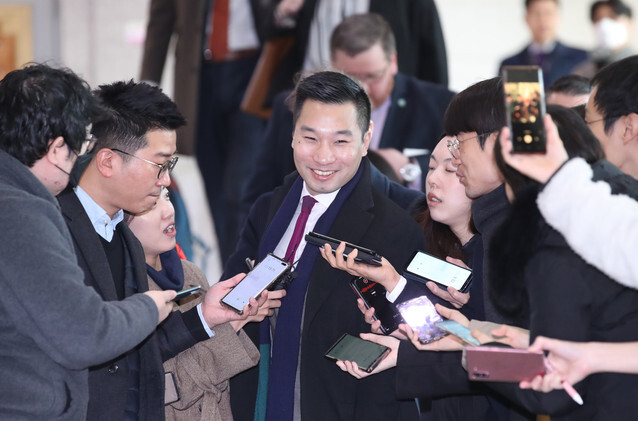hankyoreh
Links to other country sites 다른 나라 사이트 링크
[Editorial] Trump’s attempt to maintain “status quo” with N. Korea is miscalculation

Key officials in charge of North Korea issues for the Donald Trump administration in the US have been departing one after another. On Feb. 11, the White House announced that Alex Wong, the State Department’s deputy special representative for North Korea, had been tapped as alternate UN representative for special political affairs. Last month, State Department Special Envoy for North Korea Mark Lambert left the North Korea lineup when he was appointed a UN special envoy for the “integrity of multilateral institutions.” It is troubling to see these North Korea policy officials moving on right as the curtain is rising on the US presidential election. It raises the possibility that amid a lack of commitment on the Trump administration’s part, the already strained dialogue between Pyongyang and Washington is now shuddering to a halt.
Many had predicted that Wang’s role in North Korea policy would grow when Special Representative for North Korea Stephen Biegun was appointed late last year as deputy secretary of state. Wang visited South Korea just a few days ago, discussing individual tourist visits to Mt. Kumgang and inter-Korean railway and road linkage efforts at a South Korea-US working group meeting. His sudden transfer stands to create difficulties for coordination between Seoul and Washington on inter-Korean cooperation projects, which are an area of emphasis for the South Korean administration.
Recently, the Trump administration has shown clear signs of trying to distance itself from North Korea issues. For the first time since taking office, Trump did not mention North Korea even once in his state of the union address last week. The US press recently quoted White House advisors as saying that Trump does not want to meet with North Korean leader Kim Jong-un during the period leading up to the presidential election in November.
In remarks on Feb. 11, White House National Security Advisor Robert O’Brien was circumspect on the possibility of a North Korea-US summit, saying, “We'll have to see as to whether another summit between the leaders is appropriate.” It seems possible that the changes in the State Department’s North Korea lineup are an extension of this.
If Trump’s aim to simply manage the “status quo” on North Korea issues until the election, this could be a grave miscalculation on his part. North Korea may opt to respond forcefully, possibly by testing the “new strategic weaponry” it announced in a Workers’ Party of Korea plenary meeting. Trump needs to recognize the lesson that the past 20 years have taught us: when it comes to the North Korean nuclear issue, there is no “maintaining the status quo” -- things either get better or they get worse.
We look forward to the US actively pursuing a resumption of dialogue with North Korea. Rather than talking about his “closeness” with Kim Jong-un, it’s time for Trump to try to win him over with a practical solution that North Korea will be willing to listen to.
Please direct comments or questions to [english@hani.co.kr]

Editorial・opinion
![[Editorial] Penalties for airing allegations against Korea’s first lady endanger free press [Editorial] Penalties for airing allegations against Korea’s first lady endanger free press](https://flexible.img.hani.co.kr/flexible/normal/500/300/imgdb/original/2024/0502/1817146398095106.jpg) [Editorial] Penalties for airing allegations against Korea’s first lady endanger free press
[Editorial] Penalties for airing allegations against Korea’s first lady endanger free press![[Editorial] Yoon must halt procurement of SM-3 interceptor missiles [Editorial] Yoon must halt procurement of SM-3 interceptor missiles](https://flexible.img.hani.co.kr/flexible/normal/500/300/imgdb/child/2024/0501/17145495551605_1717145495195344.jpg) [Editorial] Yoon must halt procurement of SM-3 interceptor missiles
[Editorial] Yoon must halt procurement of SM-3 interceptor missiles- [Guest essay] Maybe Korea’s rapid population decline is an opportunity, not a crisis
- [Column] Can Yoon steer diplomacy with Russia, China back on track?
- [Column] Season 2 of special prosecutor probe may be coming to Korea soon
- [Column] Park Geun-hye déjà vu in Yoon Suk-yeol
- [Editorial] New weight of N. Korea’s nuclear threats makes dialogue all the more urgent
- [Guest essay] The real reason Korea’s new right wants to dub Rhee a founding father
- [Column] ‘Choson’: Is it time we start referring to N. Korea in its own terms?
- [Editorial] Japan’s rewriting of history with Korea has gone too far
Most viewed articles
- 160% of young Koreans see no need to have kids after marriage
- 2Months and months of overdue wages are pushing migrant workers in Korea into debt
- 3[Editorial] Penalties for airing allegations against Korea’s first lady endanger free press
- 4[Guest essay] Maybe Korea’s rapid population decline is an opportunity, not a crisis
- 51 in 3 S. Korean security experts support nuclear armament, CSIS finds
- 6[Reporter’s notebook] In Min’s world, she’s the artist — and NewJeans is her art
- 7Bills for Itaewon crush inquiry, special counsel probe into Marine’s death pass National Assembly
- 8S. Korea discusses participation in defense development with AUKUS alliance
- 9Japan’s standards for use of preemptive counterstrike against N. Korea remain unclear
- 10Trump asks why US would defend Korea, hints at hiking Seoul’s defense cost burden